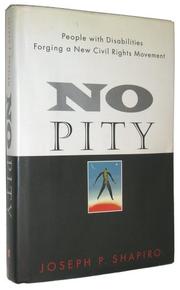

NO PITY
How the Disability Rights Movement is Changing America
by Joseph P. Shapiro
A timely but diffuse chronicle of the ways that both society and self-perceptions have changed for America's largest minority- -the 35-to- 43 million people with disabilities. Shapiro (a writer for U.S. News & World Report) begins his story at Berkeley in the 1960's with activist Ed Roberts, a polio survivor, and the Physically Disabled Students' Program, whose self-help approach launched the disability-rights movement in the US and led to protest groups staging sit-ins to dramatize their demand for access to public transportation. The author tracks disability-rights legislation from the Rehabilitation Act of 1973, which prohibited federally funded institutions from discriminating against the handicapped, to the Americans with Disabilities Act of 1992, which requires businesses to provide access for the handicapped and bans employers from discriminating on the basis of disability. Although the movement has achieved great success in a relatively short time, the disabled are still a fragmented coalition, with different groups emphasizing different aims. Many of the deaf, for instance, urge a separatist route, promoting deaf culture rather than integration into the hearing world. Shapiro also looks at the special concerns of the blind, the autistic, and the mentally retarded. He examines the impact of technology on aid for the disabled, the need for nursing-home reform, and the potential for backlash as the public becomes aware of the costs of implementing disability laws. Shapiro interviewed hundreds of people for this report, and his conversations with them bring life to his pages, reducing the distance between the disabled and others. A helpful introduction, but Shapiro loses focus and impact by attempting to survey too many different issues.